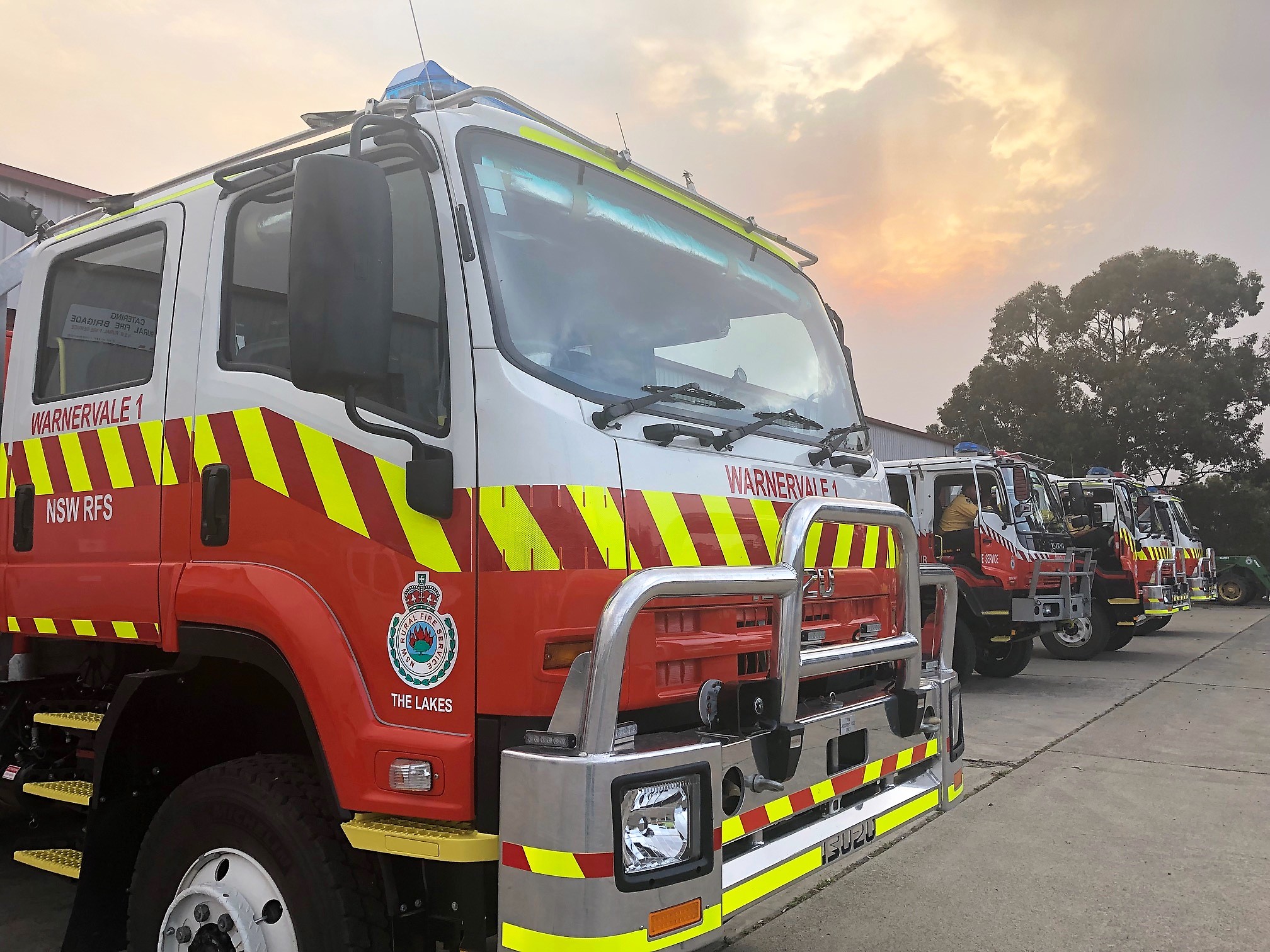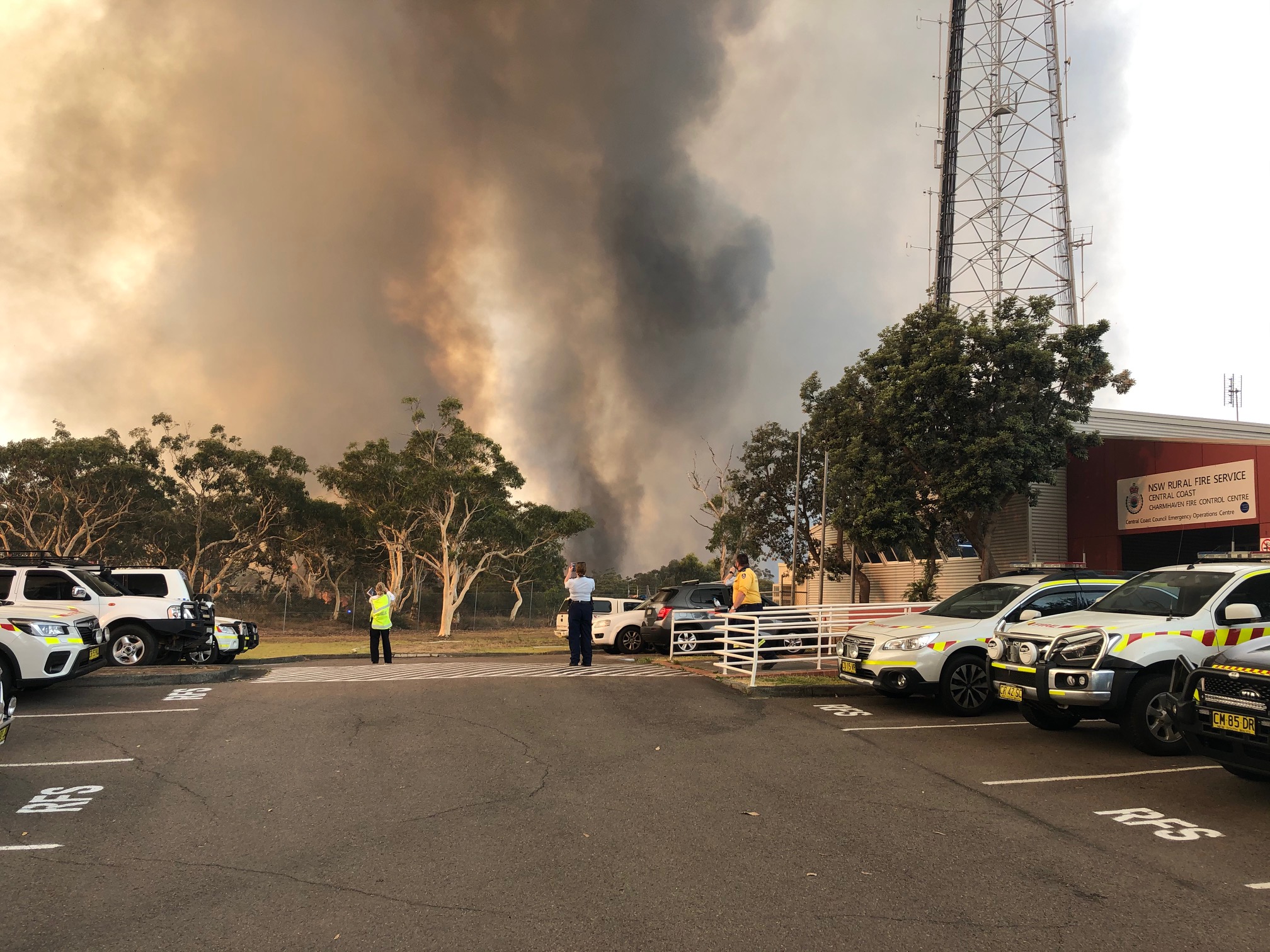Central Coast Council joined the NSW Rural Fire Service (RFS) and other emergency services and support agencies on Friday 9 September 2022 at the Central Coast Fire Control Centre at Charmhaven to run through a mock emergency incident exercise to continue to improve our response in readiness of future natural disaster events.
The NSW Rural Fire Service (RFS) coordinated an Incident Management Exercise (IMX) to establish a learning environment for participants to exercise and test their emergency response capabilities. The IMX involved a significant bushfire event in the neighbouring Lake Macquarie Local Government Area which involved 'mock' interjections of various emergency scenarios and the activation of both the Lake Macquarie and Central Coast Emergency Operations Centres (EOC) to support RFS as the lead combat agency for bush fires.
The IMX ensures that both the Lake Macquarie and Central Coast Local Emergency Management Committees (LEMCs) are sufficiently prepared to respond to a major natural disaster event, or other emergencies, that require a coordinated response across multiple Local Government Areas and agencies.
Participants in this IMX included:
• NSW Rural Fire Service
• NSW Police
• NSW State Emergency Service
• NSW Fire & Rescue
• NSW Ambulance
• NSW Health
• Transport NSW
• Central Coast Council
• Lake Macquarie Council
• NSW Environment Protection Authority
• National Parks and Wildlife Services
• Ausgrid
• Salvation Army
This is one of the activities that the Central Coast LEMC undertakes and/or participates in to ensure all member organisations are prepared and well trained to respond to any natural disaster or emergency event - which is in line with Council's community education campaign to encourage local residents to also 'Get Ready' to understand their risks and prepare for emergencies with an up-to-date emergency plan.
With the Central Coast experiencing a wide range of emergency events and extreme weather in recent years including severe bushfires, storms, flooding and coastal erosion, in addition to the Covid-19 pandemic, Council is experienced in responding to emergencies, working closely with emergency service providers and support agencies and our local communities. However, each event has its own challenges and set of unique circumstances where lessons can be learnt. Both the Central Coast LEMC and Council have processes for post event evaluation to identify these lessons and develop recommendations for improvements that can be implemented in preparation ahead of the next event.
In an emergency situation, connectivity with your neighbours is important and this is no different for Council the emergency service providers and support agencies that rely on planned and coordinated teamwork for strong and co-ordinated response and recovery actions.
- For community information and resources on preparing for an emergency, go to Council's dedicated webpage on emergency preparedness and resilience at centralcoast.nsw.gov.au.
- For more information on emergency service providers, and management of emergency events go to Council's website here.
BACKGROUND
Council's role during an emergency event
During an emergency, Council is not an Emergency Service Provider.
During natural disaster emergencies, the following agencies are the lead Emergency Service Providers, also known as Combat Agencies:
- For emergencies during bushfires, the NSW Rural Fire Service (RFS) (www.rfs.nsw.gov.au) is the lead Emergency Service Provider.
- For emergencies during storms, floods, tsunamis or coastal erosion events, the NSW State Emergency Service (www.ses.nsw.gov.au) is the lead Emergency Service provider.
Council's role during a local emergency is to:
- Serve as a conduit for key information on the emergency event from the Emergency Service Providers (for example the RFS and SES).
- Support the lead Emergency Service Provider with the resources, people and equipment they need to manage the emergency and any follow-up recovery actions (as per legislative requirements of the State Emergency Management Plan
- Continue our constant and close monitoring of Council managed open spaces, reserves, facilities and roads for any impacts.
- Mobilise our own resources, people and equipment to respond to any identified impacts.
- Provide key information to the community and relevant stakeholders about how Council's services or facilities are impacted such as Water and Sewer Services, Waste Collection and availability of Child Care Centres, Libraries and Community Halls.
- Drive community-led approaches to coping with the emergency.
The Central Coast Emergency Operations Centre (EOC) may be activated (or stood up) during an emergency event at the discretion of the Local Emergency Operations Controller (LEOCON) who works for the NSW Police Force. If the EOC is activated during an Emergency event, Council will:
- Ensure that the EOC is functional and adequately resourced to support an emergency response.
- Provide a Local Emergency Management Officer (LEMO) to support coordination of the emergency response, a Liaison Officer (LO) to act as a conduit between the EOC and Council's Incident Management Team (IMT) and provide other support staff such as communications officers.
Council works closely with the Local Emergency Management Committee (LEMC) to ensure that all aspects of Emergency Response are well supported and resourced.
For more information on emergency service providers, and management of emergency go to Council's website here.
Key contact details during an emergency event
- In life-threatening emergencies, or for urgent help from Police, Fire or Ambulance services, call 000 (Triple Zero).
- Bush fires: For bushfire emergencies, call 000 (Triple Zero). For current incident information, call the bushfire information line on 1800 679 737 or check the NSW Rural Fire Service website, social media or the Fires Near Me app.
- Storms, floods, tsunamis or coastal erosion events: Call the NSW SES on 132 500, 24 hours 7 days a week. You can also contact SES if you have experienced damage from storms, wind, hail or a fallen tree and if a tree branch is threatening your property or a person's safety.
- Central Coast Council: To report urgent issues, such as water, sewer, road hazards, or to contact rangers in an emergency, please call Council on 1300 463 954. Council has an emergency on-call service available for out of hours. Non urgent enquiries, requests, reports can be made to Council at any time through the online Customer Service Centre at any time.


photos:
main photo - NSW RFS Incident Management Exercise, September 2022
photos in news story - Emergency Operations Centre during 2019 bush fire event






